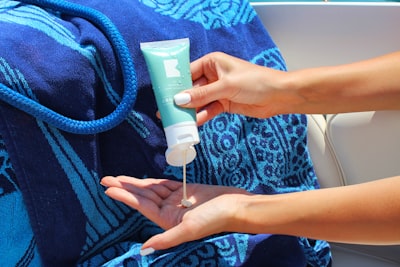Wondering How to Get Rid of Dehydration Lines Under Eyes?
Dehydration lines under the eyes can make you look older and tired. They are a result of insufficient moisture in the skin and can be caused by various factors such as age, weather, and even lifestyle habits. In this blog, we will discuss what dehydration lines under the eyes are, how they differ from wrinkles, and how to recognize the signs of dehydrated skin. We will also talk about the role of proper skincare in reducing lines, the importance of sun protection, and how diet influences your skin's hydration, and what kind of water or proper IV drink intake to look at in order to combat this problem. Additionally, we will share practical tips on how to prevent dehydration lines under eyes (and other places), recommended products for hydrated skin, and balancing oily skin to prevent dehydration lines. Lastly, we will answer some common questions regarding itchy skin and lifestyle habits contributing to skin dehydration. Read on to learn more about how to deal with this common issue and achieve youthful-looking, hydrated skin.
Understanding Dehydration Lines Under Eyes
These lines under eyes, as the name suggests, are caused by a lack of moisture in the skin. These lines can make the under eye area appear aged and tired. It's important to understand that proper hydration is essential for preventing and reducing dehydration lines. Factors like aging and sun exposure can exacerbate these lines, so it's crucial to protect your skin from the sun and take care of it as you age. Using hydrating skincare products can also help improve the appearance of such lines, keeping your skin looking fresh and youthful.
Hydro-Stats! Some Fun Facts...
- Eye creams specifically formulated for the thin skin under your eyes are better than regular moisturizers.
- Dermatologists recommend applying sunscreen every two hours.
- One of the first places that dehydration shows itself is on our skin.
Causes of Dehydration Lines
This problem can occur due to various factors. Dry weather and low humidity are common culprits, as they can lead to dry skin and the formation of dehydration lines. Inadequate water intake is another factor that can contribute to the development of these lines. Environmental conditions like air conditioning and heating can also strip the skin of its moisture, resulting in dehydration lines. Excessive alcohol consumption can further dehydrate the skin, causing lines to appear. Additionally, these can be a sign of aging and decreased collagen production. By understanding these causes, you can take steps to prevent and address dehydration lines effectively.
How These Lines Differ From Wrinkles
When it comes to the under-eye area, it's important to understand how dehydration lines differ from wrinkles. While wrinkles are permanent creases caused by aging and loss of elasticity, these types of lines are temporary and can be improved with proper hydration. Dehydration lines are more superficial than wrinkles and often appear as fine lines. These lines are typically caused by a temporary lack of moisture in the skin. The good news is that unlike wrinkles, this can be prevented and improved with adequate hydration. So, if you want to tackle those pesky lines under your eyes, make sure to keep your skin well-hydrated and moisturized.
Recognizing the Signs of Dehydrated Skin
Honestly, these signals can manifest in various ways, with dull and lackluster skin being a common indicator. Another telltale sign is the presence of triangular fine lines around the eyes. Dark under eyes can also be a result of insufficient moisture in the skin. Additionally, dehydrated skin tends to feel tight and uncomfortable. If you notice an increased appearance of wrinkles, it may also be a sign of skin dehydration. By recognizing these signs, you can take steps to address and prevent further dehydration, ensuring your skin stays healthy and hydrated.
1 | Itchy Skin
Itchy skin can be a common symptom of skin dehydration. When the skin lacks moisture and becomes dry, it can lead to itchiness and discomfort. Hydrating the skin is crucial to relieve itchiness and restore comfort. Using a moisturizer with ingredients like hyaluronic acid can help soothe itchy skin and provide much-needed hydration. Proper hydration is also essential in preventing itching and subsequent dehydration lines. By incorporating regular hydration practices and using products designed to hydrate the skin, you can keep your skin moisturized, healthy, and free from the discomfort of itchiness.
2 | Dark Under Eyes
Dehydration can contribute to the appearance of dark circles under the eyes, making the delicate under-eye skin appear darker. To combat this, moisturizing the under-eye area is key. By incorporating a caffeine-based eye cream, you can further diminish the visibility of dark under eyes. Sufficient hydration is also crucial for promoting a brighter and more youthful eye area. By understanding the impact of dehydration on dark circles and taking steps to moisturize and hydrate the under-eye skin regularly, you can effectively reduce the visibility of dark under eyes. Good news is that these best tips can be incorporated into your skincare routine on a regular basis.
3 | Dull Skin
Dehydrated skin often lacks radiance and appears dull. To restore its natural glow and vitality, hydrating the skin is crucial. Regular exfoliation can help get rid of dead skin cells and enhance skin brightness. Using skincare products with antioxidants can rejuvenate dull skin by combating free radicals. Additionally, drinking plenty of water improves overall skin hydration, resulting in a brighter and more vibrant complexion. So, if you're looking to combat dull skin, incorporating these tips into your skincare routine on a regular basis can make a significant difference. The good news is that you don't have to settle for lackluster skin – there are effective ways to bring back the radiance!
4 | Triangular Fine Lines
Triangular fine lines are a common sign of skin dehydration. To minimize these lines, it's important to moisturize regularly. Plumping the skin with moisture can help reduce the visibility of triangular fine lines. Another effective way to improve the appearance of fine lines is by incorporating a serum with peptides. The peptides work to enhance the skin's elasticity and smooth out those lines. Adequate hydration is key in rejuvenating the skin and minimizing triangular fine lines. By ensuring your skin is well-hydrated, you can maintain a more youthful and vibrant complexion. Regular moisturizing and the use of suitable skincare products can make a significant difference in combating dehydration lines.
5 | Sensitive Skin
Dehydration can worsen skin sensitivity, leading to discomfort. To prevent irritation in sensitive skin, it is advisable to use gentle cleansers. Hydrating toners can also soothe and balance the skin. Avoiding harsh ingredients is crucial to maintaining the integrity of sensitive skin. Proactive hydration plays a key role in reducing redness and improving skin resilience. Dry skin, oily skin, and combination skin all benefit from these skincare tips. The good news is that by following these best tips on a regular basis, you can combat skin sensitivity caused by dehydration and achieve a healthier complexion.
6 | They Go Away Overnight
Dehydration lines under the eyes can appear and disappear quickly, thanks to fluctuating moisture levels. Proper hydration is key to preventing the transient appearance of these lines. By consistently moisturizing the skin, you can promote long-term skin health and prevent their recurrence. Hydrating masks are a great way to provide instant relief and improve the skin's hydration levels. And of course, establishing a regular skincare routine that focuses on hydration can help maintain youthful and hydrated skin. So, don't worry if these lines show up overnight – with the right hydration and skincare practices, they can also go away just as quickly!
The Role of Proper Skincare
A consistent skincare routine plays a crucial role in preventing and reducing dehydration lines under the eyes. By gently and regularly cleansing the skin, you can remove dead cells and promote hydration. Adding hydrating serums and moisturizers to your routine helps replenish moisture and improve skin elasticity. Sunscreen should be used daily to protect the delicate skin from sun damage and dehydration. Additionally, skincare products containing hyaluronic acid are beneficial as they help plump and hydrate the skin. Incorporating these best tips into your regular skincare regimen will keep your skin looking hydrated and youthful.
Key Ingredients for Hydration
When it comes to hydrating your skin, there are key skincare ingredients that can work wonders. One such ingredient is hyaluronic acid, which has the ability to attract and retain moisture, keeping your skin plump and hydrated. Ceramides are another important ingredient that helps strengthen the skin barrier, preventing moisture loss. Antioxidants like vitamin C not only protect your skin from free radicals but also promote hydration. Peptides play a crucial role in stimulating collagen production and improving skin elasticity. Additionally, moisturizers containing glycerin and squalane provide long-lasting hydration. Incorporating these ingredients into your skincare routine can help keep your skin hydrated and healthy.
The Importance of Sun Protection for Preventing Dehydration Lines
Excessive sun exposure can dehydrate the skin, leading to the formation of dehydration lines. UV rays have the potential to damage the skin's natural barrier and compromise its ability to retain moisture. To combat this, it is essential to incorporate sun protection into your skincare routine. Using sunscreen with SPF not only shields the skin from harmful UV damage but also helps prevent dehydration. Additionally, wearing sunglasses and a wide-brimmed hat can provide added protection for the delicate under eye area. Regular application of sunscreen is crucial in preventing premature aging and the appearance of dehydration lines. Remember, protecting your skin from the sun is key to maintaining a hydrated and youthful complexion.
How Diet Influences Your Skin's Hydration
Proper nutrition plays a crucial role in maintaining skin hydration. Drinking enough water is essential for keeping the skin hydrated from within. Consuming foods rich in omega-3 fatty acids, like salmon and chia seeds, can promote skin hydration. Foods high in antioxidants, such as berries and leafy greens, help protect the skin from dehydration. Avoiding excessive alcohol consumption and sugary drinks can help prevent skin dehydration. By incorporating these dietary changes, you can support your skin's moisture levels and maintain a healthy complexion. Good news! Taking care of your diet can make a noticeable difference in preventing dehydration lines under the eyes.
Essential Nutrients for Skin Hydration
To maintain hydrated and healthy skin, incorporating essential nutrients into your diet is crucial. Vitamin E, an antioxidant, nourishes and hydrates the skin, while Omega-3 fatty acids support healthy skin cell function and retain moisture. Vitamin C promotes collagen production, improving skin hydration. Green tea not only provides hydration but also supplies antioxidants for the skin. Additionally, foods rich in water content, such as cucumbers and watermelon, contribute to skin hydration. By including these essential nutrients in your diet on a regular basis, you can help keep your skin well-hydrated and glowing. Remember to consult with a dermatologist for the best tips and advice tailored to your specific needs.
Practical Tips on How to Prevent Dehydration Lines
To prevent dehydration lines, it's important to take a proactive approach to skincare. Start by drinking plenty of water throughout the day to keep your skin hydrated and combat dryness. Use a gentle cleanser that removes impurities without stripping away moisture, helping to maintain a balanced complexion. Exfoliation is key to removing dead cells and improving the absorption of hydrating products. Follow a consistent skincare routine that includes moisturizing and applying sunscreen to protect against seasonal changes and sun damage. Additionally, consider using a humidifier in dry environments to add moisture to the air and prevent thirsty skin. By following these best tips on a regular basis, you can keep dehydration lines at bay. Good news for those with combination or oily skin - these tips are suitable for all skin types.
- Up Your Water Intake - Maintaining optimal skin hydration is essential to combat dehydration lines under the eyes. One effective way to achieve this is by increasing your daily water intake. Aim to drink at least eight glasses of water per day to keep your thirsty skin hydrated and healthy. For added flavor and hydration, you can infuse your water with fruits or herbs. To remind yourself to hydrate throughout the day, carry a reusable water bottle with you. Additionally, setting reminders or using hydration tracking apps can help ensure that you're consistently drinking enough water. By upping your water intake, you can improve your skin's complexion and prevent the formation of dehydration lines.
- Treat Your Allergies - To effectively treat your allergies and help prevent dehydration lines under your eyes, it's important to identify and avoid allergens that may contribute to skin dryness. Consulting with an allergist can provide valuable insights and help determine the best treatment options for your allergies. Maintaining a clean and dust-free home environment, free of pet dander, can also help reduce allergen exposure. Using allergy medication as prescribed by your doctor can provide relief from symptoms and minimize the impact of allergies on your skin. Additionally, taking steps to improve indoor air quality, such as using air purifiers, can help create a healthier environment for your skin. Remember, addressing your allergies can not only alleviate symptoms but also benefit your overall skin health.
- Steer Clear of Culprits - To keep your skin hydrated and prevent dehydration lines under your eyes, it's essential to steer clear of drying culprits. One of the main culprits is excessive sun exposure, as it can lead to skin dehydration. It's also important to limit the use of harsh cleansers and skincare products that strip away natural oils, as they can further dehydrate your skin. Additionally, be mindful of hot showers and baths, as they can dry out your skin. To combat dehydration, choose moisturizers and serums that contain hydrating ingredients like hyaluronic acid. And don't forget to drink plenty of water throughout the day to keep your skin hydrated from within.
- Humidifiers - To combat dehydration lines under the eyes, using a humidifier can be incredibly beneficial. By investing in a high-quality humidifier, you can add much-needed moisture to the air in your home. Maintaining a humidity level between 40% and 60% is important for optimal hydration. Placing the humidifier in your bedroom ensures hydration while you sleep, allowing your skin to replenish itself. Using distilled or filtered water in the humidifier prevents mineral buildup, ensuring clean and healthy hydration. Remember to clean and maintain the humidifier regularly to prevent the growth of harmful bacteria. Incorporating a humidifier into your skincare routine is a simple yet effective way to combat dehydration lines and promote well-hydrated, glowing skin.
- Wear Sunscreen - To protect your skin from harmful UV rays, it's crucial to wear sunscreen daily. Opt for a broad-spectrum sunscreen with at least SPF 30, which shields your skin from both UVA and UVB rays. Remember to reapply sunscreen every two hours, especially if you're spending time outdoors. Additionally, wearing protective clothing like hats and sunglasses offers extra defense against the sun's damaging effects. Seeking shade during peak sun hours can also minimize sun exposure. By incorporating these tips into your skincare routine, you can ensure proper sun protection and reduce the risk of dehydration lines under your eyes.
- Depuffers - When addressing dehydration lines under the eyes, it's important to look for skincare products that contain peptides. Peptides can effectively reduce the appearance of these lines by promoting collagen production and improving skin elasticity. Additionally, using eye creams or serums specifically formulated to target puffiness and under-eye bags can be beneficial. Look for ingredients like caffeine and antioxidants, as they help depuff and brighten the eye area. Gently massaging the eye area when applying skincare products also promotes circulation and reduces fluid retention. Consider incorporating cooling eye masks or patches into your routine for further depuffing effects. Remember, when dealing with dehydration lines, finding the right ingredients and techniques is key.
- Talk to Your Dermatologist - If you've tried various skincare products and techniques to address dehydration lines under your eyes without much success, it may be time to consult with a dermatologist. A dermatologist can provide personalized advice and recommend treatment options tailored to your specific needs.
During your consultation, your dermatologist may suggest procedures like dermal fillers or laser resurfacing to help smooth out fine lines and improve the overall appearance of your under-eye area. Prescription topical treatments, such as retinoids, might also be recommended to enhance skin texture and reduce wrinkles.
Don't hesitate to discuss any concerns or questions you have about your skin's hydration and potential treatments during your appointment. Your dermatologist will provide valuable insights and guidance based on their expertise. It's important to follow their advice and recommendations for the best possible results.
Achieving Youthful-looking, Hydrated Skin
To achieve youthful-looking, hydrated skin, it's important to maintain a consistent skincare routine. Start by cleansing your face daily to remove dirt and impurities that can contribute to dryness. Exfoliating regularly helps to slough off dead skin cells and reveal a fresh complexion. Moisturizing is essential for hydrating thirsty skin and preventing dehydration lines. Look for skincare products that are specifically formulated for your skin type, whether you have dry skin, oily skin, or combination skin. Additionally, hydrate your skin from the inside out by drinking plenty of water and following a balanced diet. Protecting your skin from sun damage by wearing sunscreen daily is also crucial. Finally, consider incorporating anti-aging ingredients like retinol and vitamin C into your skincare routine, as they can help diminish dehydration lines and promote a more youthful appearance.
Recommended Products for Hydrated Skin
To achieve hydrated skin, it's important to use the right products. Look for moisturizers that contain hydrating ingredients like hyaluronic acid and ceramides. These ingredients help to lock in moisture and prevent dryness. For an extra boost of hydration throughout the day, consider using a facial mist or essence. These products can be spritzed onto the skin for instant hydration. When cleansing your skin, opt for a gentle cleanser that won't strip away its natural moisture. Incorporating a hydrating serum or oil into your skincare routine can also provide added moisture. And don't forget to include an eye cream specifically formulated for the delicate eye area.
Balancing Oily Skin to Prevent Dehydration Lines
When it comes to preventing dehydration lines under your eyes, balancing oily skin is key. Start by using a gentle cleanser that effectively removes excess oil without stripping the skin of its natural moisture. Avoid over-washing or scrubbing your face, as this can lead to dehydration. Opt for lightweight, oil-free moisturizers that provide hydration without adding greasiness to your complexion. Incorporating exfoliation into your skincare routine is also important to remove dead cells and prevent clogged pores. Consider using a clay mask once or twice a week to absorb excess oil and impurities. By following these best tips on a regular basis, you can maintain hydrated skin and prevent dehydration lines from forming.
Routine for Combating Dead Skin Cells
To combat dead skin cells and promote cell turnover, it's important to exfoliate regularly. You can choose between a physical or chemical exfoliant based on your skin type and preference. When exfoliating, remember to use gentle, circular motions to avoid any irritation. After exfoliation, make sure to follow up with a hydrating moisturizer to replenish moisture in your skin. However, it's crucial to be mindful of not over-exfoliating, as it can lead to skin sensitivity and dryness. By incorporating these best tips into your skincare routine on a regular basis, you can effectively combat dead skin cells and maintain a healthy complexion.
Can Itchy Skin Lead to Dehydration Lines?
Itching can harm the skin's protective barrier, causing dehydration lines. Itchy skin may indicate dryness and lack of moisture. Hydrating the skin helps relieve itchiness and prevents dehydration lines. Soothing moisturizers nourish itchy skin and enhance hydration. Addressing the root cause prevents dehydration lines.
Are Your Lifestyle Habits Contributing to Skin Dehydration?
Lifestyle habits can contribute to skin dehydration and the appearance of dehydration lines. Lack of water intake, excessive alcohol consumption, and unprotected sun exposure can all lead to moisture loss. Establishing a daily skincare routine and using a humidifier in dry environments can help maintain skin hydration.
Lastly,... Let's Talk Skin Sensitivity
Sensitive skin, with its delicate nature, is prone to dehydration. To prevent irritation and maintain hydration, it is essential to use gentle cleansers that won't strip the skin of its natural moisture. Harsh skincare products should be avoided as they can exacerbate skin sensitivity. Nourishing hydrating serums with soothing ingredients can help replenish and protect sensitive skin. Regular moisturization is key to strengthening the skin barrier and reducing sensitivity. By following these best tips and incorporating them into your regular skincare routine, you can keep your skin hydrated and minimize skin sensitivity. Good news is, by taking good care of your complexion and addressing any seasonal changes or habits like consuming too much alcohol, you can prevent dehydration lines and maintain healthy, radiant skin.
Frequently Asked Questions
How long do dehydration lines on face take to go away?
Dehydration lines on the face typically take a few hours to a few days to go away. The duration depends on the severity of dehydration and skin elasticity. Drinking plenty of water and using skincare products with hyaluronic acid can help reduce their appearance.
When should you consult a dermatologist about your dehydration lines?
If your dehydration lines are severe or persistent, it may be time to see a dermatologist. Professional advice on skincare and treatment options can be offered by a dermatologist. Consulting a dermatologist sooner rather than later can prevent further damage to the delicate under-eye area.
How long does it take to see results from using treatments for dehydration lines under the eyes?
Results from treatments for dehydration lines under the eyes can vary based on individual factors. Some treatments may show immediate results, while others may take weeks or months. Consistency and patience are key in achieving desired outcomes. Always follow the treatment instructions and consult with a dermatologist if needed.
What are some home remedies to help get rid of dehydration lines?
To combat dehydration lines, try these home remedies. Stay hydrated by drinking plenty of water to improve skin elasticity. Apply a moisturizing eye cream or serum daily for added hydration. Reduce puffiness and inflammation with a cold compress or cucumber slices. Boost circulation and hydration by massaging your under-eye area with coconut oil or almond oil. Get enough restful sleep for skin cell repair and regeneration.
Conclusion
In conclusion, dehydration lines under the eyes can be a common concern, but there are ways to deal with them effectively. By understanding the causes of dehydration lines and recognizing the signs of dehydrated skin, you can take the necessary steps to prevent and reduce their appearance. Proper skincare, including key hydrating ingredients and sun protection, plays a crucial role in maintaining hydrated and youthful-looking skin. Additionally, adopting a balanced diet and implementing practical tips such as increasing water intake and using a humidifier can help prevent dehydration lines. Remember to consult with a dermatologist for personalized treatment recommendations. With consistent care and attention, you can achieve a more hydrated and rejuvenated under-eye area.
DISCLAIMER: THIS WEBSITE DOES NOT PROVIDE MEDICAL/HEALTH ADVICE
The information, including but not limited to, text, graphics, images and other material contained on this website are for informational purposes only. No material on this site is intended to be a substitute for professional medical advice, diagnosis or treatment. Always seek the advice of your physician or other qualified health care provider with any questions you may have regarding a medical condition or treatment and before undertaking a new health care regimen, and never disregard professional medical advice or delay in seeking it because of something you have read on this website.









